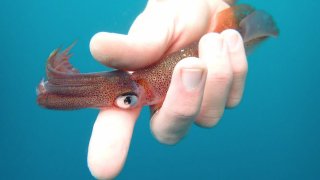
Stanford researchers have solved a mystery about why a species of squid native to California has been found thriving in the Gulf of Alaska about 1,800 miles north of its expected range: climate change.
The answer raises more questions about the potential impacts on other species and ecosystems, according to a news release from Stanford New Service issued early Monday.
"When animals move, they're not just sightseeing," said Benjamin Burford, a former graduate student in biology in the School of Humanities and Sciences at Stanford who led the research. Wherever the squid end up, they will breed, eat, and be eaten, and those actions will have inevitable consequences on the species around them, Burford explained.
The study was published in the March 4 issue of "The American Naturalist" and details how climate change ushered the squid north. It also documents how the squid has grown in size and lives twice as long as its California relatives.
Get a weekly recap of the latest San Francisco Bay Area housing news. Sign up for NBC Bay Area’s Housing Deconstructed newsletter.
The researchers identified a few climate change-related factors - warming waters, decreased oxygen saturation and shifting presence of competing species - that made it easier for any individual squid to meet its needs in Alaska than to meet them in its home range from Baja California to Monterey Bay. It is generally the type of squid found in grocery stores and fish markets in the state.
In California, the squid's life span is about six months and it grows to 120 millimeters (4.7 inches) long on average.
In Alaska, researchers have found the same species since 2015 is significantly larger -- with an average length of 160 millimeters (6.3 inches) -- and lives almost twice as long, which is similar to the average sizes recorded 70 years ago in California.
Local
The larger size of the squid is significant, researchers said, because that would allow it to feed on more than just its usual diet of crustaceans.
This could allow the squid to eat small fish, which could either be the meal of its important new neighbors or the important neighbors themselves, like young salmon. Thus, the migrant squid may not only be harming the native creatures inhabiting Alaskan waters, but Alaskan fishers as well.
Researchers believe these changes have occurred in a relatively short time span of six generations, a total of just three years.
"As climate change progresses, there are bound to be other species like the California market squid that move to more suitable seas," said Mark Denny, the John B. and Jean De Nault Professor in Marine Science at Hopkins Marine Station and senior author on the paper. "Investigating what happens to this squid and the ecosystems around them right now will help researchers predict what could happen to other marine life later."




